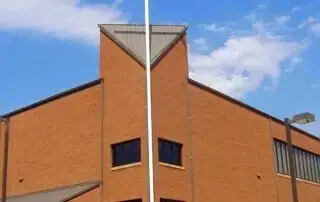Mars Hill Primitive Baptist Church sits just off a country road in rural Cleburne County. The building, constructed in the mid-1990s to replace another destroyed by fire, is a simple wood-framed building with white siding. A few feet from the front door is a sheltered picnic table, once a gathering place for local families and their kin who came once a month to sing sacred harp hymns, hear the preacher and enjoy dinner-on-the-grounds. That’s no longer the case.
Like many churches of its kind, Mars Hill Baptist now is mostly abandoned. Even the church’s annual sacred harp singing has ceased. The electricity has been turned off and local families tied to the church’s history keep the grass cut. County deputies have been called to the church’s remote location more than once in the last few years to investigate criminal activity in or near the church, and nearby residents wonder what the future holds for the building and land.
Abandoned buildings
What to do with abandoned church buildings is a growing concern across denominations. Dying churches are not just Primitive Baptist churches, nor are they just rural churches. In June the United Methodist Church in North Alabama announced that nine churches, including churches in Bessemer and Cullman, would close by June 2016. In New York and Boston, Roman Catholic officials have closed more than 50 churches in the past 10 years. At one Boston Catholic church, protesters have kept vigil for 11 years in an effort to keep their church open. The Catholic Archdiocese of Boston went to court in May to try to evict the parishioners. (continued…)
Read the rest of the story from The Alabama Baptist Newspaper at: http://www.thealabamabaptist.org/print-edition-article-detail.php?id_art=34940#sthash.A3Np2hsW.dpuf







 by
by